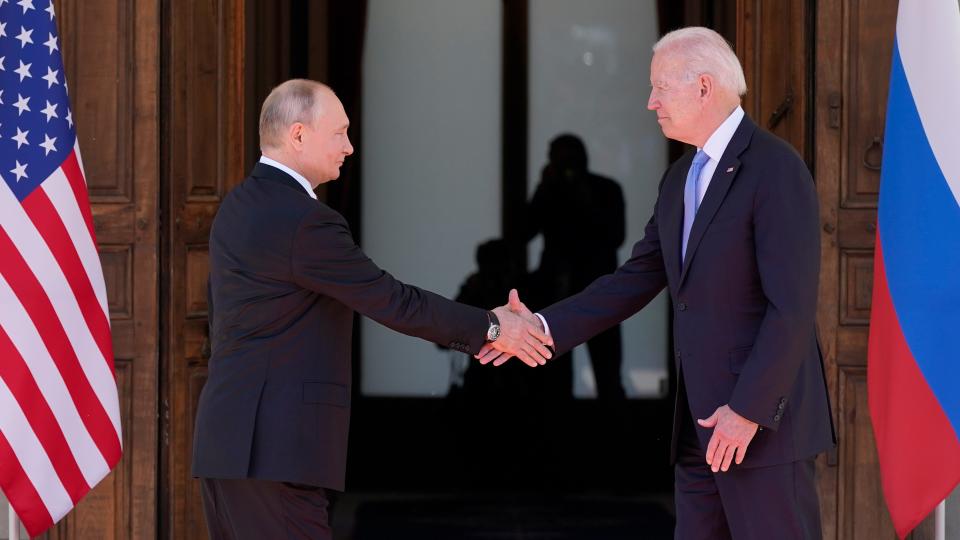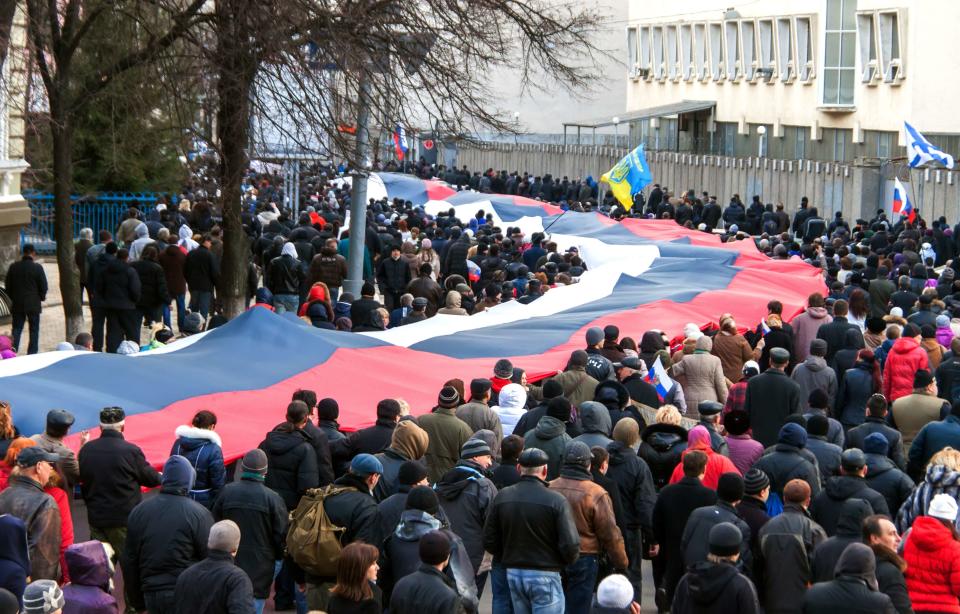Video diplomacy: Biden warns Putin against Ukraine invasion in high-stakes call
WASHINGTON – President Joe Biden warned Russian President Vladimir Putin Tuesday that further aggression against Ukraine would come with huge costs to the Russian economy.
"President Biden voiced the deep concerns of the United States and our European Allies about Russia’s escalation of forces surrounding Ukraine and made clear that the U.S. and our Allies would respond with strong economic and other measures in the event of military escalation," the White House said in a statement released after the secure video call that lasted two hours.
Biden reiterated his support for Ukraine’s sovereignty and territorial integrity and called for de-escalation and a return to diplomacy, the statement said.
But in addition to tough economic sanctions, he warned that the U.S. would send additional defense resources to Ukraine above what it is already providing and would be looking to deploy additional forces to fortify its NATO allies in the area in response to a Russian incursion in Ukraine.
"There was no finger-wagging, but the president was crystal clear about where the United States stands on all of these issues," White House National Security Adviser Jake Sullivan said of Biden's conversation with the Russian leader.
Biden’s high-stakes video call with Putin came as U.S. intelligence reports a buildup of Russian troops on Ukraine’s border, raising alarms that an invasion may be imminent.
A senior administration official who briefed reporters ahead of the call said the U.S. doesn’t know whether Putin has decided to pursue further military escalation in Ukraine. “But we do know that he is putting in place the capacity to engage in such escalation should he decide to do so,” the official said.
The two presidents tasked their teams to follow up, and the U.S. will do so in close coordination with allies and partners, the White House said.
More: What is happening at Ukraine's border? Putin's buildup of Russian troops sparks concern

Secretary of State Antony Blinken spoke Monday with Ukrainian President Volodymyr Zelenskyy ahead of Biden’s call with Putin. Blinken tweeted that he reiterated that U.S. support for Ukraine is unwavering and that there would be serious consequences for any escalation from Russia.
Biden spoke Monday with the leaders of France, Germany, Italy and the United Kingdom to coordinate his message and ensure that he goes into the Putin conversation with allies united behind him and with strong transatlantic solidarity on the way forward.
The leaders called on Russia to de-escalate tensions, agreed that diplomacy is the only way to resolve the conflict and underscored their support for Ukraine’s sovereignty and territorial integrity, the White House said in a statement.
Biden spoke with the European leaders again Tuesday to update them on his conversation with Putin and consult with them on a way forward.
Biden plans to speak with congressional leaders about ways in which the administration and Congress can work together on a bipartisan basis to stand up for American interests and stand behind our friends and partners, Sullivan said.
Biden also plans to speak Thursday with Ukrainian President Volodymyr Zelenskyy, Sullivan said.
U.S. relations with Russia have been turbulent since Biden took office in January. Biden's administration has imposed sanctions against Russian targets and called out Putin for the Kremlin’s interference in U.S. elections, cyberactivity against American companies and the treatment of opposition figure Alexei Navalny, who was poisoned last year and later imprisoned.
The call between the two leaders on Tuesday was an attempt to defuse the conflict over Ukraine before any further escalation.
"There's a realization that this is important enough that it is a crisis in the making, or maybe a full-blown crisis already" leading both sides to push for a meeting, said Marcus Holmes, a professor of government at College of William & Mary.
The two leaders also planned to discuss other issues, including cybersecurity and Iran’s nuclear program, the administration official said.
A new medium for old pros
The two leaders are hardly strangers to diplomacy, with Biden and Putin having conversed for decades.
"What we're dealing with is two leaders who are very experienced, who already have something in terms of rapport. They're not starting from scratch," said Andrew Weiss, the vice president for studies at the Carnegie Endowment for International Peace.
Unlike their engagement this summer in Geneva, however, Biden and Putin will be facing each other via a secure video chat, an increasingly common diplomatic reality amid the coronavirus pandemic.
"The video conference is emerging as a kind of middle ground between a face-to-face summit and a quick call," said Samuel Charap, a political scientist at the RAND Corporation, a military think tank.
Weiss, who worked on Russian affairs in the George H.W. Bush and Clinton administrations, said there's no substitute for in-person communication. That said, Biden and Putin have "already had a series of phone calls" and an in-person summit on top of years of experience with each other.
That history will be essential as the two countries seek to assure the other of their intentions in eastern Europe. Analysts have expressed worry, though, that virtual meetings can hinder the subtle communication in talks that may clinch a deal. That is especially important on high-stakes topics, such as averting war in Ukraine.
"I think it's important that they're talking, period," Charap said. "The question is: Does the video conference format present its own set of challenges? I think the answer is clearly yes, in particular for this generation of leaders who are used to interacting with peers and getting a sense of who they are in person."
Familiarity does not mean that conflict can be easily avoided, though. U.S. engagement with Russia over the years has shown little change in behavior, analysts note, because of rival interests – not a lack of communication.
"My feeling is the fear of why the situation is so inflammatory is because the goals are incompatible," said Orysia Lutsevych, a fellow at Chatham House, a British think tank, and the former executive director of the Open Ukraine Foundation.
"I honestly cannot see what kind of compromise the U.S. can give into Russia to save its face value as a global leader, and not to betray its democratic commitments in Ukraine," Lutsevych said.
Russian troops similarly amassed on the Ukrainian border in April, which led to the leaders' first call of Biden's term. The forces demobilized, but conflict in eastern Ukraine continued unabated.
"Putin is not the kind of leader who bluffs twice, so we might have dodged the bullet back in spring," Charap said.

The dangers of war
In 2014, Russian forces annexed the Crimean Peninsula from Ukraine, shocking Western governments. The U.S. and its allies instituted a number of sanctions on the country that have since had little effect on its behavior in the region.
Russia continues to support pro-Russian separatists in Ukraine, leading to brutal violence in the country's east. The violence has killed at least 3,393 civilians and more than 7,000 civilian casualties since 2014, according to an October United Nations human rights report.
The United States and its NATO allies have supported Ukraine economically and militarily in recent years, enraging Russia, which fears such moves are a precursor to a future expansion of the military alliance.
Follow Matthew Brown and Michael Collins online @mrbrownsir and @mcollinsNEWS.
Contributing: The Associated Press
This article originally appeared on USA TODAY: Biden warns Russia against Ukraine invasion in video chat with Putin

 Yahoo Movies
Yahoo Movies 